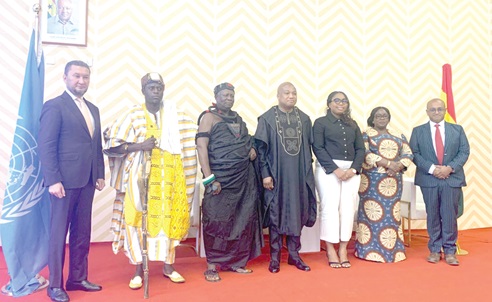The Minister of Foreign Affairs, Samuel Okudzeto Ablakwa, has called for reformation of international financial institutions to ensure sustainable development and financing for developing countries.
He said the reformation of international financial institutions must include the voting structures of the International Monetary Fund (IMF) and the World Bank to ensure that developing economies had a meaningful role in global decision-making.
Mr Ablakwa said without addressing the structural inequities embedded in the global financial system, it would be difficult to advance the 2030 Agenda for Sustainable Development or achieve the goals of the Paris Agreement.
The Minister of Foreign Affairs was speaking at the UN@80 High-Level Dialogue in Accra last Wednesday, organised by the United Nations (UN) Country Office in collaboration with the Ministry of Foreign Affairs.
The event brought together members of the diplomatic corps, government officials, state agencies, departments and traditional authorities.
Trapped in debt
Mr Ablakwa reiterated President John Mahama’s call for the reformation of the global financial architecture, indicating that the present structures were rigged against Africa.
“Too many developing nations remain trapped in cycles of unsustainable debt, while the promise of fair access to capital and trade remains elusive.
As President John Dramani Mahama rightly reminded the international community at the 80th Session of the UN General Assembly, ‘we demand not only a reform of the Security Council, but also a reset of the global financial architecture, which is currently rigged against Africa’,” he said.
This call, he said, echoed the collective demand of the Global South for a more balanced system of global governance, one that gave all nations an equitable voice and fair opportunity in shaping our shared economic future.
The Foreign Affairs Minister called on the UN to continue to play a central role in championing financial justice by advocating debt relief, sustainable investment and innovative financing mechanisms that empowered countries to invest in their own development.
He added that predictable, concessional and climate-sensitive financing must become a cornerstone of a renewed multilateralism which prioritised people and planet over politics and profit.
Mr Ablakwa said although the challenges before the world were complex, they were not insurmountable, if the world acted together, guided by the principles of solidarity, inclusivity and shared responsibility that laid at the heart of the UN.
Cooperation
For his part, the UN Resident Coordinator, Zia Choudhury, underscored the importance of dialogue, cooperation and multilateralism in building a better future for all.
Mr Choudhury said it was vital that the world remembered the devastating impact of conflicts, citing World War II, which claimed an estimated 50-60 million lives directly and up to 85 million lives in total.
He stressed that the future could not be achieved alone and required shared responsibility, strong partnerships, and a renewed commitment to multilateral cooperation. He praised Ghana for being a consistent and reliable partner dedicated to the UN’s ideals.
World challenges
The Resident Coordinator identified pressing issues, including climate change, displacement, inequality, misinformation and the erosion of institutions built to uphold peace and justice as some key challenges the present world faced.
He emphasised the need for coordinated and practical action to address the challenges; adding that institutions such as the UN and the ICC faced real tests of credibility now.
Images are for reference only.Images and contents gathered automatic from google or 3rd party sources.All rights on the images and contents are with their legal original owners.

